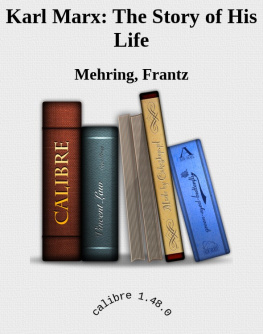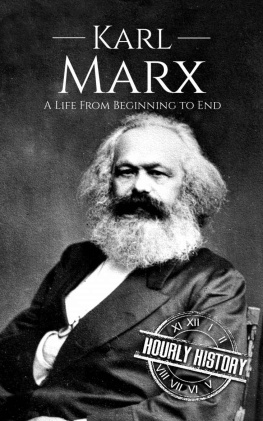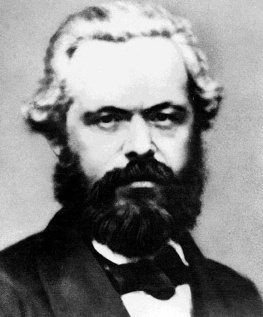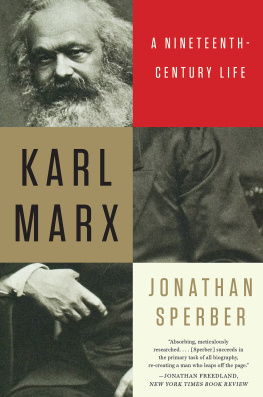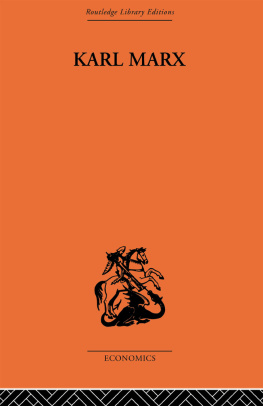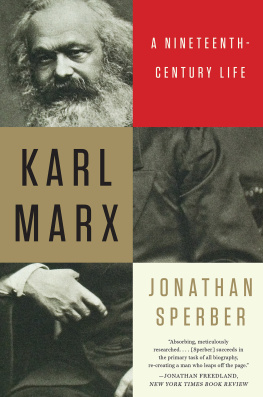Mehring - Karl Marx: The Story of His Life
Here you can read online Mehring - Karl Marx: The Story of His Life full text of the book (entire story) in english for free. Download pdf and epub, get meaning, cover and reviews about this ebook. year: 2015, genre: Non-fiction. Description of the work, (preface) as well as reviews are available. Best literature library LitArk.com created for fans of good reading and offers a wide selection of genres:
Romance novel
Science fiction
Adventure
Detective
Science
History
Home and family
Prose
Art
Politics
Computer
Non-fiction
Religion
Business
Children
Humor
Choose a favorite category and find really read worthwhile books. Enjoy immersion in the world of imagination, feel the emotions of the characters or learn something new for yourself, make an fascinating discovery.
- Book:Karl Marx: The Story of His Life
- Author:
- Genre:
- Year:2015
- Rating:4 / 5
- Favourites:Add to favourites
- Your mark:
- 80
- 1
- 2
- 3
- 4
- 5
Karl Marx: The Story of His Life: summary, description and annotation
We offer to read an annotation, description, summary or preface (depends on what the author of the book "Karl Marx: The Story of His Life" wrote himself). If you haven't found the necessary information about the book — write in the comments, we will try to find it.
Mehring: author's other books
Who wrote Karl Marx: The Story of His Life? Find out the surname, the name of the author of the book and a list of all author's works by series.
Karl Marx: The Story of His Life — read online for free the complete book (whole text) full work
Below is the text of the book, divided by pages. System saving the place of the last page read, allows you to conveniently read the book "Karl Marx: The Story of His Life" online for free, without having to search again every time where you left off. Put a bookmark, and you can go to the page where you finished reading at any time.
Font size:
Interval:
Bookmark:
The Story of His Life
Originally published: (in German) in 1918.
Translator: Edward Fitzgerald.
Publisher: Covivi, Friede Publishers, 1935.
Transcribed: Sally Ryan for marxists.org, October 2000.
THE AUTHOR Of this biography was born in 1846 in Pomerania of a well-to-do middle-class family. He studied at the universities of Berlin and Leipzig, taking the degree of Doctor of Philosophy at the latter. From the beginning his leanings were democratic and liberal, and when the time came for him to submit himself to the stupidities of the Prussian drill sergeant he left Prussia and went to live in Leipzig, which in those days was foreign territory. This deliberate revolt caused the breaking off of relations between him and his family. Whilst still a young man he began to take an active part in public life and in the political struggles of the day. At the age of 25 he was a member of the small band of democrats led by Guide Weiss and Johann Jacoby which had sufficient courage to protest openly against the annexation of Alsace-Lorraine by Bismarck after the Franco-Prussian War.
Mehrings chief activities were journalistic and literary, and for many years he was a contributor to prominent liberal and democratic newspapers, and later on an editor. All his life he had a keen sense of justice, and the feeling that injustice was being done was always sufficient to bring him on the scene. He defended Platen against Heine, Lassalle and Bakunin against Marx and Engels, Schweitzer against Bebel, and Bernstein against Liebknecht, and together with Rosa Luxemburg he fought a brilliant polemic against Kautsky and Riazanov. That he was not always on the side of the angels the reader of this book will discover for himself, but wherever he was to be found it was not because he had first considered the consequences for himself, but because his own sense of justice had compelled him with imperative logic.
At about the age of 30 he became a socialist of the Lassallean school, appearing in the arena with a pamphlet against the historian Treitschke. It is to this period of a socialism strongly tinged with nationalism that his attacks on the Social Democracy and on Marx belong. Like many another well-meaning and liberal-minded man from the ranks of the possessing classes, he approached the working-class movement equipped with democratic and liberal principles and a desire to assist the workers, and he suffered the failure and disappointment which such an approach inevitably brings with it. However, unlike many others, he did not then withdraw to nurse his wounded dignity and bemoan the proletarian lack of gratitude, but, spurred on by his initial failure, he came to grips with the problem and emerged as a Marxist.
It was in 1890 that the final breach with his own class took place. He was then the chief editor of the democratic Berliner Volkszeitung and in its columns he resolutely opposed Bismarcks policy and defended the social democrats, Who were still being persecuted under the Anti-Socialist Law. His attacks on Bismarck were extremely effective and the latter answered with a threat of suppression unless the shareholders dismissed the uncomfortable critic. True to those traditions of pusillanimity which caused both Marx and Engels to despair of the German bourgeoisie, the shareholders swallowed their democratic principles to defend their economic interests, and Franz Mehring was sacrificed. At the age of 44 he took the final and logical step and joined the Social Democratic Party.
The period of his greatest literary activity now opened up. The Neue Zeit, at that time under the editorship of Karl Kautsky, published many brilliant articles from his pen, including the famous series which appeared in book form in 1893 as The Lessing Legend, the classic Prussian history of the Frederician age, and caused Friedrich Engels to write to Kautsky from London declaring that the articles made him look forward with impatience to every new number of the publication. Throughout the years which followed up to the time of his death Mehrings pen produced innumerable articles on philosophic, historical, military, literary and political subjects, and won him a foremost position in the international socialist movement. The chief scene of his activities was the writing-desk, but for all that he was no arm-chair strategist, but a lighter all the time with the sharpest weapons at his disposal, and he used them with all his energy against a powerful enemy.
From the closing years of the last century onwards when the revolutionist efforts of Bernstein and his friends undermined revolutionary Marxism in the social-democratic organization and provided the yearnings of its leaders for respectability with a theoretical cloak, Mehring was in the front ranks of those who fought strenuously against a policy which led logically to the collapse of the German working-class movement in 1914. Throughout the war years he remained true to the principles of socialist internationalism and, despite his advanced years, he spent many months in prison. Together with Clara Zetkin and Rosa Luxemburg the only real men in the social-democratic movement as he was fond of calling them, he raised aloft the banner of proletarian internationalism in the heroic Spartakist League. He lived to see the first post-war class struggles and the defeat of the revolutionary workers, and he died in January, 1919, shortly before his 73rd birthday, his death undoubtedly being hastened by the terrible tidings which reached him a day or two before that his two friends Rosa Luxemburg and Karl Liebknecht had been slaughtered by white mercenaries. With his death German literature lost a brilliant author and trenchant critic, and the German working class lost a great historian and socialist theoretician and the greatest literary man the socialist movement has yet produced.
Artistic or other talent may not be a suitable subject for historical research, but historical conditions make it into something which becomes such a subject, and, apart from his historical writings, Mehrings greatest service to the working-class movement was his practical application of the Marxist historical materialist method to cultural and literary problems. In this respect he was a pioneer, for both Marx and Engels very rarely ventured into this field, their time being almost wholly taken up with the more direct economic, philosophical and political phases of the revolutionary movement. How long and how often will socialists continue to regret that Marx finally never did carry out his intention of writing a monograph on Balzac and his Comdie Humaine? The significance of Franz Mehring on this field is nowhere better described than in a letter of congratulation written to him on his 70th birthday by Rosa Luxemburg:
... For decades now you have occupied a special post in our movement, and no one else could have filled it. You are the representative of real culture in all its brilliance. If the German proletariat is the historic heir of classic German philosophy, as Marx and Engels declared, then you are the executor of that testament. You have saved everything of value which still remained of the once splendid culture of the bourgeoisie and brought it to us, into the camp of the socially disinherited. Thanks to your books and articles the German proletariat has been brought into close touch not only with classic German philosophy, but also with classic German literature, not only with Kant and Hegel, but with Lessing, Schiller and Goethe. Every line from your brilliant pen has taught our workers that socialism is not a bread and butter problem, but a cultural movement, a great and proud world-ideology. When the spirit of socialism once again enters the ranks of the German proletariat the latters first act will be to reach for your books, to enjoy the fruits of your lifes work ... To-day when intellectuals of bourgeois origin are betraying us in droves to return to the fleshpots of the ruling classes we can laugh contemptuously and let them go: we have won the best and last the bourgeoisie still possessed of spirit, talent and character Franz Mehring.
Font size:
Interval:
Bookmark:
Similar books «Karl Marx: The Story of His Life»
Look at similar books to Karl Marx: The Story of His Life. We have selected literature similar in name and meaning in the hope of providing readers with more options to find new, interesting, not yet read works.
Discussion, reviews of the book Karl Marx: The Story of His Life and just readers' own opinions. Leave your comments, write what you think about the work, its meaning or the main characters. Specify what exactly you liked and what you didn't like, and why you think so.

